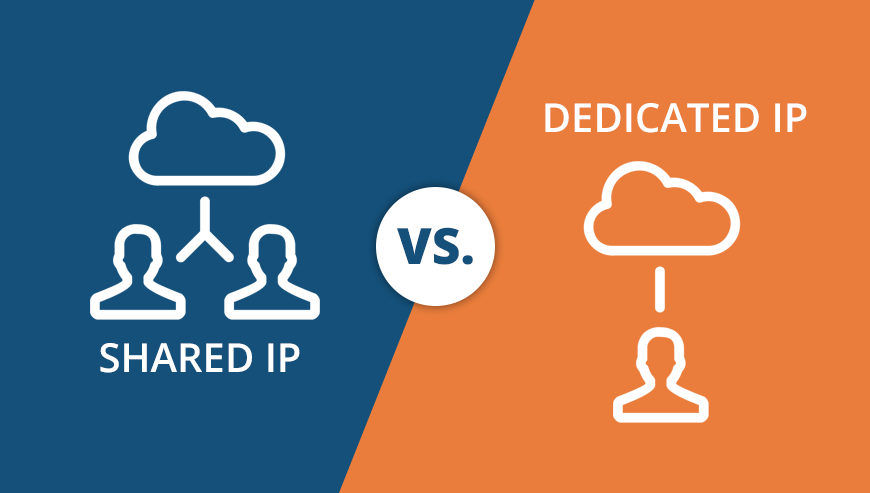When it comes to sending business emails at scale—whether for marketing, transactions, or system notifications—choosing the right type of IP address can make or break your deliverability. While many businesses focus on crafting great content and visuals, few realize that how your email is sent is just as important as what you send.
The choice between a dedicated IP and a shared IP directly affects your sender reputation, inbox placement, and overall performance. Let’s explore what each means and which option suits your business best.
What Is a Shared IP?
A shared IP means multiple organizations or users send their emails from the same IP address. It’s like living in an apartment building—everyone shares the same address, and the behavior of one tenant can affect everyone else. Shared IPs are common in email marketing platforms where smaller senders don’t need or can’t afford their own infrastructure.
Advantages of Shared IPs:
- Lower cost: Since the IP is shared among many users, you don’t need to pay for setup or maintenance.
- No warm-up required: Reputable email providers manage IP reputation and sending volumes for you.
- Perfect for small senders: If you send fewer than 10,000 emails per month, you won’t benefit much from a dedicated IP.
Disadvantages of Shared IPs:
- Reputation risk: If another sender on the same IP sends spam, your emails might also get filtered or blocked.
- Limited control: You can’t influence reputation, sending limits, or deliverability rules.
- Inconsistent inbox placement: Your deliverability depends on the collective behavior of everyone using that IP.
Best Use Case:
A shared IP works best for small businesses or startups that send occasional newsletters or transactional emails and prefer simplicity over customization.
What Is a Dedicated IP?
A dedicated IP is an IP address used exclusively by your organization for sending emails. You alone control the sending reputation, schedule, and authentication setup.
Advantages of Dedicated IPs:
- Full control over reputation: Only your sending practices affect the IP’s standing with ISPs.
- Improved deliverability for consistent senders: When properly warmed up, dedicated IPs help maintain stable inbox placement.
- Better suited for branding: You can align your IP with your domain identity, giving ISPs a consistent trust signal.
- Scalable for high-volume senders: Ideal for businesses sending over 100,000 emails per month.
Disadvantages of Dedicated IPs:
- Requires warming up: You need to build trust with ISPs by gradually increasing your sending volume.
- Higher cost: Most providers charge a setup or maintenance fee for dedicated IPs.
- Needs consistent volume: Low sending activity can make the IP appear “cold,” which hurts deliverability.
Best Use Case:
A dedicated IP is best for medium to large organizations that send frequent campaigns, transactional emails, or notifications at scale—such as e-commerce platforms, financial institutions, or SaaS companies.
Which One Should You Choose?
Your decision depends on volume, consistency, and control.
Volume:
- Shared IP: Best for low to medium email volumes.
- Dedicated IP: Ideal for high-volume senders (100K+ emails per month).
Cost:
- Shared IP: Lower cost; perfect for small businesses with limited budgets.
- Dedicated IP: Higher cost due to exclusive ownership and management.
Control:
- Shared IP: Limited control—your deliverability depends on other senders sharing the same IP.
- Dedicated IP: Full control over sending reputation and email behavior.
Reputation Risk:
- Shared IP: Reputation is shared; one bad sender can hurt everyone’s deliverability.
- Dedicated IP: Independent reputation—your performance depends only on your own sending habits.
Warm-up Required:
- Shared IP: No warm-up process needed; ready to use immediately.
- Dedicated IP: Requires gradual warm-up to build a strong reputation over time.
Best For:
- Shared IP: Small businesses or startups sending occasional campaigns.
- Dedicated IP: Large brands, e-commerce platforms, and enterprises with consistent, high-volume email activity.
Pro Tip: Hybrid Approach
Some advanced email platforms offer a hybrid model—you use shared IPs for marketing emails but a dedicated IP for transactional or high-priority communications. This ensures that critical messages like password resets or billing statements are always prioritized while keeping your marketing costs manageable.
Deliverability Is Built on Trust
Both shared and dedicated IPs can deliver strong results if used properly. The key is understanding your email volume and deliverability goals.
If you send small, occasional campaigns, a shared IP offers convenience and cost efficiency. If your brand relies on high-volume or reputation-sensitive communications, a dedicated IP gives you control and consistency.
In the end, email deliverability isn’t just about technology—it’s about trust. Choosing the right IP strategy ensures your emails not only get sent but actually get seen.

